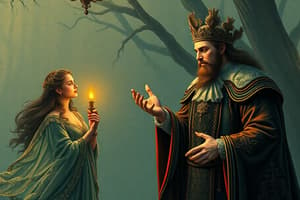Podcast
Questions and Answers
What motivates Macbeth's ambition to become king?
What motivates Macbeth's ambition to become king?
- Support from Lady Macbeth
- A prophecy from the three witches (correct)
- The fear of losing his title
- His deep desire for wealth
Which character is primarily responsible for pushing Macbeth towards murder?
Which character is primarily responsible for pushing Macbeth towards murder?
- Malcolm
- Duncan
- Banquo
- Lady Macbeth (correct)
What is the significance of blood in Macbeth's story?
What is the significance of blood in Macbeth's story?
- It symbolizes guilt and the consequences of ambition (correct)
- It is a motif of honor and valor in battle
- It represents purity and innocence
- It highlights the theme of betrayal
How does Macbeth's character change throughout the tragedy?
How does Macbeth's character change throughout the tragedy?
What ultimately leads to Macbeth's downfall?
What ultimately leads to Macbeth's downfall?
Flashcards are hidden until you start studying
Study Notes
Macbeth's Ambition
- Macbeth is driven by a combination of ambition, prophecy, and the influence of his wife, Lady Macbeth.
- The witches' prophecy fuels his desire for the throne, predicting he will become Thane of Cawdor and eventually King.
- Macbeth initially hesitates, but Lady Macbeth pushes him to act, arguing that his ambition should not be hindered by fear.
Lady Macbeth's Influence
- Lady Macbeth is the primary force driving Macbeth towards murder.
- She is more ambitious and ruthless than Macbeth, manipulating him with her strong will and persuasive arguments.
- Despite her initial confidence, she eventually succumbs to guilt and madness, highlighting the destructive nature of ambition.
The Symbolism of Blood
- Blood is a recurring symbol in Macbeth, representing guilt, violence, and the consequences of ambition.
- Macbeth's hands become stained with blood after murdering King Duncan, symbolizing his transformation into a murderer.
- The constant imagery of blood and its association with Macbeth's actions emphasize the horror and violence that follow the pursuit of power.
Macbeth's Transformation
- Initially, Macbeth is a respected warrior with a strong sense of loyalty and honor.
- After the murder of Duncan, he descends into paranoia and tyranny, driven by guilt and fear.
- He becomes increasingly suspicious of those around him and commits further acts of violence to secure his power.
Macbeth's Downfall
- Macbeth's downfall is ultimately caused by a combination of his own choices, the consequences of his actions, and the forces opposing him.
- His paranoia and tyranny alienate his allies and drive his enemies to rebel.
- The prophecy of his fate, predicting his defeat, contributes to his sense of inevitability and hopelessness.
Studying That Suits You
Use AI to generate personalized quizzes and flashcards to suit your learning preferences.




